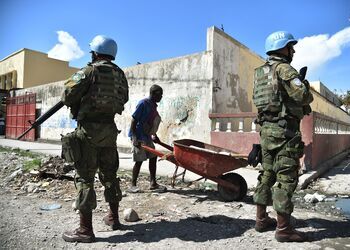The United Nations Security Council gave the green light for deploying a multinational armed force to Haiti, but questions linger regarding the effectiveness of this international security presence.
The Security Council approved the deployment on October 2 amid an unprecedented security crisis in Haiti, where the assassination of President Jovenel Moïse in 2021 worsened an economic and social collapse that has led to lawlessness and widespread hunger.
The country’s numerous criminal gangs control most of the capital, Port-au-Prince, and, in recent weeks, have expanded their attacks to towns and areas outside the city, according to Le Nouvelliste. At least 2,439 people were killed and almost 1,000 kidnapped since the beginning of 2023 through August 15, according to the UN.
SEE ALSO: UN Pushes Anti-Gang Intervention in Haiti Despite Past Failures
Kenya volunteered to aid the embattled Haitian National Police (Police Nationale d’Haïti – PNH) and restore order in the country, following months of pleas from the Haitian government and UN Secretary-General António Guterres. It has pledged 1,000 police officers to the mission. The Bahamas has offered 150 officers, and other Caribbean nations, including Antigua and Barbuda, and Jamaica, have expressed their support, although actual deployment of officers is not expected for several more months.
The United States will offer logistical and financial assistance of up to $200 million but will not deploy its security forces on the ground.
The international force will seek to support the Haitian police in re-establishing security in Haiti to create conditions conducive to holding free and fair elections. The country lacks a single elected official, and the de facto administration of Prime Minster Ariel Henry is widely considered illegitimate.
InSight Crime Analysis
While the international community has celebrated the Security Council’s decision, deploying international security forces may be futile without more substantial structural changes to Haiti’s current government and political system, which help enable the extreme gang violence plaguing the country.
“You won’t see any progress … as long as we’re stuck with the same dysfunctional government we have now, without addressing the political crisis or having a clear plan to tackle issues like impunity, corruption, and governance,” Pierre Espérance, executive director of the National Human Rights Defense Network in Haiti (Réseau National de Défense des Droits Humains – RNDDH), told InSight Crime.
The relationship between the gangs and political and police leadership poses a significant obstacle to any foreign force, he said. “The gangs aren’t particularly panicked by the UN’s decision for a specific reason: they wield considerable power today due to their connections with both the government and the police leadership,” Espérance added.
A principal objective of the international force is to establish security conditions conducive to holding free and fair elections in Haiti, according to the UN. But even if the international force manages to arrest or kill gang leaders, “they run the risk that the intervention will have only a very temporary impact,” Louis-Henri Mars, the executive director of Lakou Lapè, a Port-au-Prince-based conflict transformation and peacebuilding organization, told InSight Crime. If gang infrastructure is left intact, the gangs will likely continue to control the country’s neighborhoods, and the cycle of patronage between gangs and politicians will continue, he added.
Mars believes that gang members should be offered the chance to lay down their weapons and demobilize peacefully. However, any legal processes for demobilization would be hindered by a non-existent justice system and prisons where those incarcerated are dying of starvation.
“What kind of justice will be proposed, and what will Haitian society accept for these gangsters? If it comes to a situation where the [gangsters] can either die or be imprisoned in those jails, they very well may choose to die,” Mars said.
An international security intervention still provides no answers to the underlying structural issues that allowed Haiti to become gang-infested. To Mars, the reasons are clear: “It’s the absence of the state in the neighborhoods. The gangs fill in the void the state leaves. Even if you kill a few of them, they will rebuild the next day if that void is not filled … There needs to be state presence in the neighborhoods,” he said.

